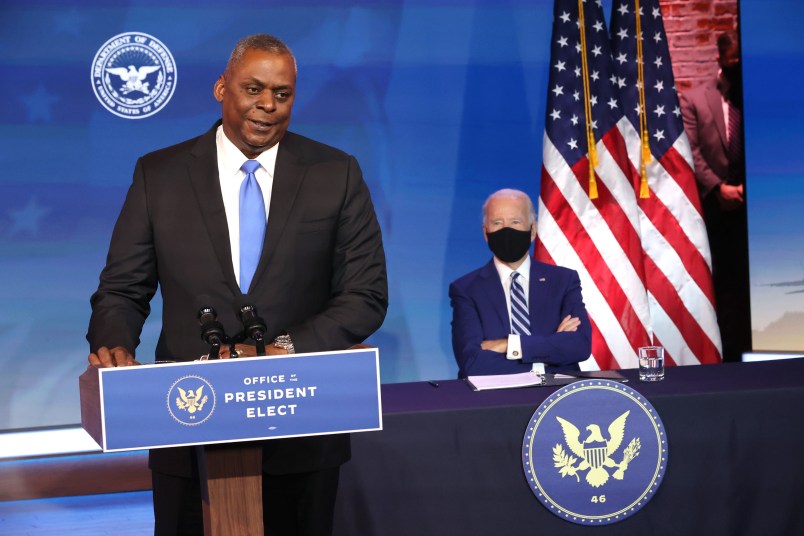President-elect Joe Biden argued Wednesday that his pick for secretary of Defense, Lloyd Austin, deserves a waiver to serve in that role despite recently leaving the military.
Austin should be able to skip over the rule regarding civilian leadership of the military precisely because he respects the civil-military divide so much, Biden said.
“The civilian-military dynamic has been under great stress the past four years, and I know that Secretary-designee Austin is going to work tirelessly to get it back on track,” Biden said.
“I’ve personally worked with this man,” the President-elect added. “I’ve seen him lead American fighting forces on the field of battle. I’ve also watched him faithfully carry out the orders of the civilian leadership of this nation.”
Biden was making the case that Congress should waive the requirement that military officers “cool off” for seven years after retirement before serving as secretary of defense.
Austin, who would be America’s first Black Defense secretary, retired in April 2016 — nine months before President Donald Trump’s first secretary of Defense, Jim Mattis, got his own waiver to circumvent the cooling-off period.
Before Mattis, the only such waiver in American history was granted by Congress to George Marshall in 1950.
For his part, Austin said he recognized that “being a member of the President’s Cabinet requires a different perspective and unique responsivities from a career in uniform,” and that he looked forward to “surrounding myself with experienced, capable civilian appointees and career civil servants who will enable healthy civil-military relations grounded in meaningful civilian oversight.”
It unclear whether that will sway members of the President-elect’s own party who voted against a waiver for Mattis four years ago.
“I believe that a waiver of the seven-year rule would contravene the basic principle that there should be civilian control of a nonpolitical military,” Sen. Richard Blumenthal (D-CT), who serves on the Senate Armed Services Committee, said of Austin.
Sen. Elizabeth Warren (D-MA) also said she’d vote against a waiver for Austin, and Sen. John Tester (D-MT) said he would likely vote against one.
A majority of Senate Democrats supported Mattis’ waiver, and while House Democrats were less supportive, the waiver still passed that body with near-universal GOP support.
Democrats who opposed Mattis’ waiver, or spoke of it as a one-off exception, will need to “twist themselves into pretzels” to ignore the same concerns for Austin, as The Washington Post put it.
Some have begun their stretching routines: Sen. Jack Reed (D-RI), the ranking member of the Senate Armed Services Committee, said in 2017 that “waiving the law should happen no more than once in a generation” and that he wouldn’t do it again.
On Tuesday, Reed changed his tune slightly. “I feel, in all fairness, you have to give the opportunity to the nominee to explain himself or herself,” he said.
Rosa Brooks, a professor at Georgetown University Law Center and a former Pentagon staffer, argued that while debates about civil-military relations are often overly formalistic, “I also think that Democrats should be better than Trump.”
“After 4 years of Trump ignoring laws and demanding exceptions to laws, it’s far more important now than in the past for Dems to show respect for even the more formalistic rules,” she said.
Biden on Wednesday emphasized that Austin, if confirmed, would have the support of a strong civilian staff who would ensure that Defense Department policies “are accountable to the American people.”
“He’ll be bolstered by a strong and empowered civilian sector and senior officers,” Biden said, before correcting himself: “Senior officials, I should say.”







A shame to put the Congressional party through all this, especially when there were other candidates available.
I think Biden ran an incredibly smart and disciplined campaign, and so I find it really surprising they made such an obvious tactical error as this. I have no doubt that Austin would be an effective SecDef, but I wouldn’t be able to support the waiver either.
I have very mixed emotions about this choice. I, personally, believe Congress erred in waiving the rule for Mattis. My default position is that SecDef should always be a civilian without military entanglements.
Although I have no reason not to give Biden the benefit of the doubt, this timely and long-overdue historical precedent comes at the cost of normalizing military leadership of DOD.
Austin presents a real dilemma, with no easy answers. I’m truly torn.
Senator Jack Reed (D-RI), himself a military veteran, has not weighed in. Reed voted in favor of Mattis’ waiver but stated he would never do that again.
Lloyd Austin is doubtless a nice guy, but he brings in a lot of conflicts of interest as the NYT pointed out. He should just get more Raytheon stock, enjoy his dividends and comfortable retirement. While the LA Times is predicting the Roaring 20s ahead,, the more likely situation is low-growth, if any, and lots of displacement in the world. I was expecting somebody along the lines of Rosa Brooks,